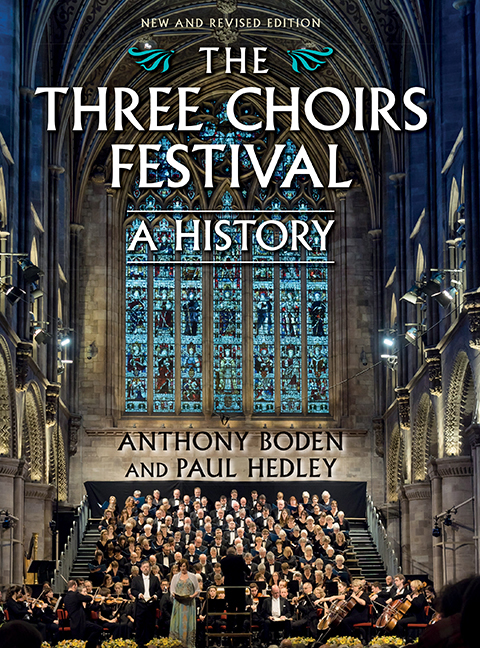Book contents
- Frontmatter
- Contents
- List of Illustrations
- Preface
- Acknowledgements
- List of Abbreviations
- List of Cathedral Organists
- 1 Origins
- 2 A Fortuitous and Friendly Proposal
- 3 A Numerous Appearance of Gentry
- 4 ‘The Musick of my Admiration Handel’
- 5 The Gentlemen and the Players
- 6 Avoiding Shipwreck
- 7 Prima voce
- 8 Favourites and Flops
- 9 Sacred and Profane
- 10 Froissart
- 11 The Unreasonable Man
- 12 The Dream
- 13 Beyond these Voices
- 14 An Essentially English Institution
- 15 The Elgar Festivals
- 16 Dona nobis pacem
- 17 Recovery
- 18 Association
- 19 A New Epoch
- 20 Jubilee
- 21 Theme with Variations
- 22 Houses of the Mind
- 23 ‘A Gold-Plated Orchestra’
- 24 A New Millennium
- 25 Reorganisation
- 26 An Invitation to the Palace
- Appendix Three Choirs Festival Timeline
- Select Bibliography
- Index
- Plate section
20 - Jubilee
Published online by Cambridge University Press: 11 August 2017
- Frontmatter
- Contents
- List of Illustrations
- Preface
- Acknowledgements
- List of Abbreviations
- List of Cathedral Organists
- 1 Origins
- 2 A Fortuitous and Friendly Proposal
- 3 A Numerous Appearance of Gentry
- 4 ‘The Musick of my Admiration Handel’
- 5 The Gentlemen and the Players
- 6 Avoiding Shipwreck
- 7 Prima voce
- 8 Favourites and Flops
- 9 Sacred and Profane
- 10 Froissart
- 11 The Unreasonable Man
- 12 The Dream
- 13 Beyond these Voices
- 14 An Essentially English Institution
- 15 The Elgar Festivals
- 16 Dona nobis pacem
- 17 Recovery
- 18 Association
- 19 A New Epoch
- 20 Jubilee
- 21 Theme with Variations
- 22 Houses of the Mind
- 23 ‘A Gold-Plated Orchestra’
- 24 A New Millennium
- 25 Reorganisation
- 26 An Invitation to the Palace
- Appendix Three Choirs Festival Timeline
- Select Bibliography
- Index
- Plate section
Summary
IT was a double celebration: the silver jubilee of Her Majesty the Queen and, dating Three Choirs from 1715, the commemoration of 250 years of musicmaking in Gloucester, Hereford and Worcester. In that same year Edinburgh was mounting only its thirty-first Festival and Cheltenham its thirty-third. The occasion was marked with six orchestras, more than thirty soloists, seven conductors, instrumental and choral groups, and a Festival extending over eight days from 20 to 28 August. There was a strong Commonwealth flavour with performers from Australia, New Zealand and Canada. Documentaries on Three Choirs were broadcast on radio and television. There were new works from Harrison Birtwistle, Peter Maxwell Davies, Rory Boyle, Ronald Tremain and Tony Hewitt-Jones, and the centrepiece – Mass of Christ the King, a large choral composition from Malcolm Williamson, Master of the Queen's Music – was dedicated to the queen for her jubilee. Certainly, the 1977 Gloucester Festival was an ambitious musical feast.
The programme had been planned to feature the music of composers who have had a major influence on the Festival during its long history: Bach's Mass in B minor; the Verdi Requiem; Kodály's Jesus and the Traders; Handel's Messiah; Holst's The Hymn of Jesus; Vaughan Williams's Fantasia on a Theme by Thomas Tallis; Beethoven's Fantasia, op. 80 (the ‘Choral Fantasy’); Britten's Cantata academica and Missa brevis; Penderecki's Stabat Mater, and, of course, Elgar – the Cello Concerto, Caractacus and Gerontius. Herbert Howells was present to hear Hymnus Paradisi and had been commissioned to write a Festival Fanfare for the Opening Service, during which the first performance of Tony Hewitt- Jones's anthem Let us now praise famous men was also given. A wide sweep of musical history was embraced, from French medieval ballads, secular and sacred music of the English Renaissance and anthems by Victoria, Schütz and Gabrieli, to sounds with the freshness of new paint: Peter Maxwell Davies's A Mirror of Whitening Light and Harrison Birtwistle's Silbury Air, both played in a Contemporary Music Network concert by the London Sinfonietta.
- Type
- Chapter
- Information
- The Three Choirs Festival: A HistoryNew and Revised Edition, pp. 269 - 277Publisher: Boydell & BrewerPrint publication year: 2017

